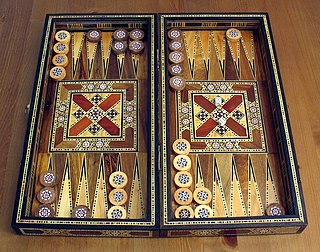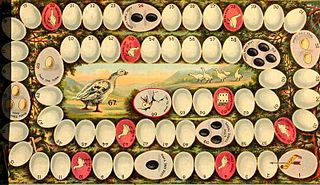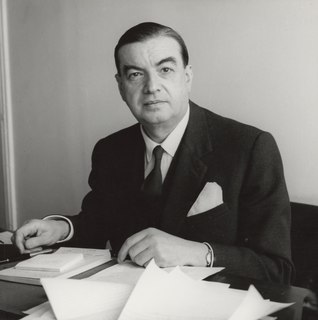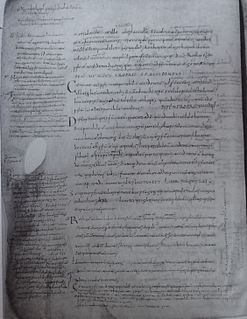Related Research Articles

Board games are tabletop games that typically use pieces moved or placed on a pre-marked board and often include elements of table, card, role-playing, and miniatures games as well.

Backgammon is one of the oldest known board games. Its history can be traced back nearly 5,000 years to archaeological discoveries in Mesopotamia. It is a two-player game where each player has fifteen pieces that move between twenty-four triangles (points) according to the roll of two dice. The objective of the game is to be first to bear off, i.e. move all fifteen checkers off the board. Backgammon is a member of the tables family, one of the oldest classes of board games.

Isidore of Seville was a Spanish scholar and cleric. For over three decades, he was Archbishop of Seville. He is widely regarded, in the words of 19th-century historian Montalembert, as "the last scholar of the ancient world".

Tables is a general name given to a class of board games similar to backgammon, played on a board with two rows of 12 vertical markings called "points". Players roll dice to determine the movement of pieces. Tables games are among the oldest known board games, and many variants are played throughout the world.

Etymologiae, also known as the Origines ("Origins") and usually abbreviated Orig., is an etymological encyclopedia compiled by Isidore of Seville (c. 560–636) towards the end of his life. Isidore was encouraged to write the book by his friend Braulio, Bishop of Saragossa. The Etymologies summarized and organized a wealth of knowledge from hundreds of classical sources; three of its books are derived largely from Pliny the Elder's Natural History. Isidore acknowledges Pliny, but not his other principal sources, namely Cassiodorus, Servius and Solinus. The work contains whatever Isidore, an influential Christian bishop, thought worth keeping. Its subject matter is extremely diverse, ranging from grammar and rhetoric to the earth and the cosmos, buildings, metals, war, ships, humans, animals, medicine, law, religions and the hierarchies of angels and saints.

Tabula, meaning a plank or board, was a Greco-Roman board game, and is generally thought to be the direct ancestor of modern backgammon.

Tafl games are a family of ancient Nordic and Celtic strategy board games played on a checkered or latticed gameboard with two armies of uneven numbers. Most probably they are based upon the Roman game Ludus latrunculorum. Names of different variants of Tafl include Hnefatafl, Tablut, Tawlbwrdd, Brandubh, Ard Rí, and Alea Evangelii. Games in the tafl family were played in Norway, Sweden, Denmark, Iceland, Britain, Ireland, and Lapland. Tafl gaming was eventually supplanted by chess in the 12th Century, but the tafl variant of the Sami people, tablut, was in play until at least the 1700s. The rules for tablut were written down by the Swedish naturalist Linnaeus in 1732, and these were translated from Latin to English in 1811. All modern tafl games are based on the 1811 translation, which had many errors. New rules were added to amend the issues resulting from these errors, leading to the creation of a modern family of tafl games. In addition, tablut is now also played in accordance with its original rules, which have been retranslated.

The Game of the Goose or Goose game is a board game where two or more players move pieces around a track by rolling a die or two dice. The aim of the game is to reach square number sixty-three before any of the other players, while avoiding obstacles such as the Inn, the Bridge and Death.

Roger Caillois was a French intellectual whose idiosyncratic work brought together literary criticism, sociology, and philosophy by focusing on diverse subjects such as games, play as well as the sacred. He was also instrumental in introducing Latin American authors such as Jorge Luis Borges, Pablo Neruda and Miguel Ángel Asturias to the French public. After his death, the French Literary award Prix Roger Caillois was named after him in 1991.
Cross and circle is a board game design used for race games played throughout the world.
In Greek mythology, Palamedes was the son of Nauplius and Clymene.

Ludus latrunculorum, latrunculi, or simply latrones was a two-player strategy board game played throughout the Roman Empire. It is said to resemble chess or draughts, but is generally accepted to be a game of military tactics. Because of the scarcity of sources, reconstruction of the game's rules and basic structure is difficult, and therefore there are multiple interpretations of the available evidence.

Alea evangelii is a member of the tafl family of games. Known from an eleventh-century Irish manuscript where it is given a Christian scriptural context, the game is played on the intersections of an 18 by 18 squares game board. This is larger than that of most tafl games.

Long dice are dice, often roughly right prisms, designed to land on any of several marked lateral faces, but not either end. Landing on end may be rendered very rare simply by their small size relative to the faces, by the instability implicit in the height of the dice, and by rolling the long dice along their axes rather than tossing. Many long dice provide further insurance against landing on end by giving the ends a rounded or peaked shape, rendering such an outcome physically impossible.
Ilinx is a kind of play, described by sociologist Roger Caillois, a major figure in game studies. Ilinx creates a temporary disruption of perception, as with vertigo, dizziness, or disorienting changes in direction of movement.
Race game is a large category of board games, in which the object is to be the first to move all one's pieces to the end of a track. This is both the earliest type of board game known, with implements and representations dating back to at least the 3rd millennium BC in Egypt, Iraq, and Iran; and also the most widely dispersed: "all cultures that have games at all have race games". Race games often use dice to decide game options and how far to move pieces.
Man, Play and Games (ISBN 0029052009) is the influential 1961 book by the French sociologist Roger Caillois, on the sociology of play and games or, in Caillois' terms, sociology derived from play. Caillois interprets many social structures as elaborate forms of games and much behaviour as a form of play.

Zohn Ahl is a roll-and-move board game played by the Kiowa Indians of North America. It is often cited as a typical representative of many similar Native American games. It is often equated with Tsoñä, also played by the Kiowa.

Israel the Grammarian was one of the leading European scholars of the mid-tenth century. In the 930s, he was at the court of King Æthelstan of England (r. 924–39). After Æthelstan's death, Israel successfully sought the patronage of Archbishop Rotbert of Trier and became tutor to Bruno, later the Archbishop of Cologne. In the late 940s Israel is recorded as a bishop, and at the end of his life he was a monk at the Benedictine monastery of Saint-Maximin in Trier.
References
Citations
- ↑ Lapidge & O'Keefe 2005 , p. 60.
- ↑ Barney et al. 2006 , XVIII.lx–lxix.2 (p. 371): "lx. The gaming-board (De tabula) Dicing (alea), that is, the game played at the gaming-board (tabula), was invented by the Greeks during lulls of the Trojan War by a certain soldier named Alea, from whom the practice took its name. The board game is played with a dice-tumbler, counters, and dice."
- ↑ Caillois 2001 , pp. 17ff.
- ↑ Bell 2012 , p. 35.
- ↑ Murray 1952 , pp. 31, 113.
Sources
- Barney, Stephen A.; Lewis, W.J.; Beach, J. A.; Berghof, Oliver (2006). The Etymologies of Isidore of Seville. Cambridge and New York: Cambridge University Press. ISBN 978-1-13-945616-6.
- Bell, Robert Charles (2012) [1979]. Board and Table Games from Many Civilizations. New York: Courier Dover Publications. ISBN 9780486145570.
- Caillois, Roger (2001) [1961]. Man, Play and Games. Urbana and Chicago: University Of Illinois Press. ISBN 978-0-25-207033-4.
- Lapidge, Michael; O'Keefe, Katherine O'Brien (2005). Latin Learning and English Lore: Studies in Anglo-Saxon Literature for Michael Lapidge. Toronto: Toronto University Press. ISBN 978-0-80-208919-9.
- Murray, H. J. R. (1952). A History of Board Games Other Than Chess . Oxford: Clarendon Press.